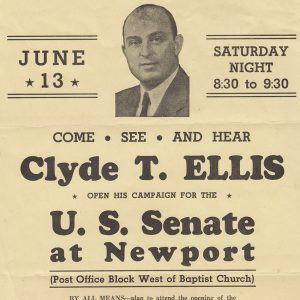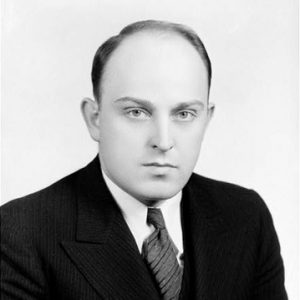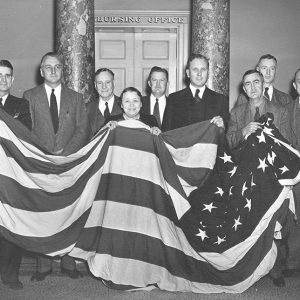calsfoundation@cals.org
Clyde Taylor Ellis (1908–1980)
Clyde Taylor Ellis was a member of the U.S. House of Representatives and a pioneer in the nation’s rural electrification movement. He served as the first general manager of the National Rural Electric Cooperative Association (NRECA), which was formed to help promote and protect the interests of the rural electrification program, a New Deal program created in 1935.
Clyde Ellis was born on December 21, 1908, to Cecil O. Ellis and Minerva Taylor Ellis on a farm near Garfield (Benton County). He was the oldest of nine children. He attended the rural Ruddick School (also known as Ozark No. 15), then attended two years of high school at Garfield High and two years at University High in Fayetteville (Washington County). Growing up on a farm with no electricity fueled his passion for rural electrification efforts.
Ellis studied at various schools throughout his life, though he received a degree only in 1956—a BS from the University of Arkansas (UA) in Fayetteville. Other schools he attended include American University in Washington DC, George Washington University Law School, and the University of Arkansas School of Law. Ellis married Izella Baker in 1931, and they had two daughters.
He taught school in Garfield in 1927–28 before serving as superintendent of the schools from 1929 to 1934. He was admitted to the Arkansas Bar Association in 1933 and began his law practice in Bentonville (Benton County). He was elected to the state House of Representatives at age twenty-five and served there until 1935, when he was elected to the state Senate. As a senator, Ellis began his long association with the rural electrification movement; he played a key role in passing legislation that allowed the state to have electric cooperatives. A Democrat, he won a seat in Congress in 1938 and served until 1943. Ellis was instrumental in the formation of the NRECA and, after he ran for the United States Senate and lost to John Little McClellan, Ellis was named its first general manager in 1943. That same year, he became a combat officer in the U.S. Navy, a post he held until 1945. He then returned to the electrification association.
As general manager of the NRECA, Ellis was known for his political savvy, oratorical skill, and ability to get things done. According to The Next Greatest Thing: 50 Years of Rural Electrification in America, a book published in 1984 by the NRECA, Ellis was the key to the association’s early success: “The record of NRECA in those years, stamped with the strong and powerful personality of Ellis and his spellbinding, single-minded leadership, is studded with stunning victories, few defeats.”
Known as “Mr. Rural Electrification,” Ellis led the electrification association through funding battles for the Rural Electrification Administration (REA), which provided low-interest loans to the nation’s electric cooperatives, and fiercely fought the power companies, which opposed the rural electrification program. Rural service was far more expensive to create than service in urban areas; when the power companies charged higher rates for rural service, their customers used less electricity, making the service increasingly unprofitable. Ellis also helped persuade the federal government to include hydropower plants at Norfork Dam in Baxter County and other dams in Arkansas that were originally designed for flood control only. He also fought major battles to give the cooperatives access to the power from those dams.
Ellis credited the NRECA’s success to the grassroots support of the electric cooperatives. “The wires which tied the houses of rural people together also seemed to unite their spirits,” Ellis wrote in his book, A Giant Step, published in 1966. “Beginning in the early days and growing through the years, there has been some unusual quality about the rural electrification program, which has drawn people of diverse political and social views together in a common purpose. The people who work for our program feel they’re working in a cause of movement or a crusade, which many of them can’t define.”
Besides the political arena, the association’s role expanded to provide many services for the nation’s electric cooperatives, including retirement and insurance plans; training for directors and employees; legal seminars for cooperative attorneys; safety training; and communications assistance.
Ellis also helped bring electricity to people in thirty other countries through the Agency for International Development (AID). This program was a compilation of various federal efforts to provide foreign aid during the Cold War. Created by the John F. Kennedy administration, AID used American dollars to fight poverty and bring about development in Third World nations. Ellis traveled to Colombia, Nicaragua, Ecuador, and other countries promoting rural electrification, using his experiences in Arkansas to prove to governments and citizens that such a program was possible anywhere in the world.
After suffering a stroke and a heart attack, Ellis retired from the electrification association in 1967 and became general manager emeritus. In 1968, he was appointed special consultant to Secretary of Agriculture Orville Freeman and held that post until 1969. In 1971, he joined his former political rival, McClellan, as a senior adviser to the U.S. Department of Agriculture. He stayed in that role until 1977, when he returned to the staff of the agriculture secretary; he remained there until he retired in 1979.
Ellis died on February 9, 1980, in Washington DC after another stroke. He is buried in Arlington National Cemetery in Arlington, Virginia.
For additional information:
Benton County Heritage Committee. History of Benton County, Arkansas. Rogers, AR: Benton County Heritage Committee, 1991.
“Clyde Taylor Ellis.” Biographical Dictionary of the United States Congress. http://bioguide.congress.gov/scripts/biodisplay.pl?index=E000132 (accessed November 13, 2024).
Ellis, Clyde T. A Giant Step. New York: Random House, 1966.
Sheila Yount
Little Rock, Arkansas
Staff of the CALS Encyclopedia of Arkansas
 Ellis Broadside
Ellis Broadside  Clyde Ellis
Clyde Ellis  Senators and Representative: 1938
Senators and Representative: 1938 



Comments
No comments on this entry yet.